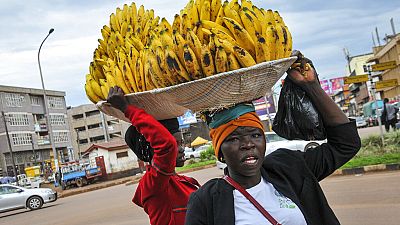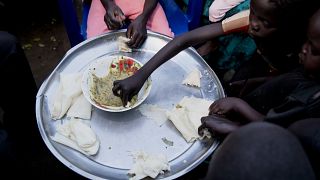Food crisis
There is no doubt Inflation is rising around the world. In sub-Saharan Africa, food is driving the trend more than others: food prices account for roughly 40% of the region’s consumption basket.
According to the UNs global food price index, in the last year, the cost of cereal went up almost 13%, meat- 17%, sugar- 20%, and vegetable oil- 34%.
A short survey by Africanews on Social media sought to find out if indeed the prices of food have increased. In an hour, 105 people had responded to the question "Have food prices increased in your country?"
90% said YES on youtube. On Facebook, all the respondents said yes with many, baking it with responses which clearly stated that indeed food prices have increased.
From these responses, this seems worrying but to an extent, this is not too surprising. Food price increases happen naturally. the prices of products increase every year.
The difference between food prices in past decades and now is largely a product of inflation of the U.S. dollar, which steadily drives up prices. Usually, this happens at a barely noticeable rate that becomes obvious only when we view food price differences over many years or decades.
This year, though, things are different—as you've probably noticed.
how did we get here?
The peak of the covid 19 pandemic in March 2020 disrupted local and global production, setting off supply chain issues. These have affected many different areas, from manufacturing and sales to the availability of medical supplies. These disruptions have also touched food supply chains.
Another school of thought also has it that, the recent increase in food inflation is attributed to rising oil prices (which raise fertilizer prices and transportation costs), droughts and export restrictions imposed by some major food exporters, and stockpiling in some countries.
Food inflation in Chad is near zero but around 30% in Angola. This suggests that domestic factors such as weather and exchange rates are important contributors to food inflation in sub-Saharan African countries.
Central Banking and the Big Forces That Guide Money
Central banks are entities that have control over the money of the countries where they operate. When these banks act, their actions may have an effect on inflation. Inflation increases food prices.
In the U.S., the Federal Reserve slows or speeds inflation of the U.S. dollar when it pursues its various strategies to shape the economy. Lately, Wei says, these policies have been increasing inflation. "Years and years of loose monetary policy," he says, are "currently coming back to bite us" in the case of higher prices.
Loose monetary policy causing inflation and higher prices is something that happens with food and more. Other essentials like gas have also seen price hikes.
A few years ago, business analysts said the U.S. increased tariffs on goods imported from China "dramatically." These high Chinese tariffs have a direct impact on food prices.
"These price increases are passed on to consumers, essentially," according to experts.
Will Food Prices Keep Increasing?
The outlook is highly uncertain. Food inflation and Consumer Price Index inflation CPI could moderate if commodity prices ease and pandemic-induced global supply chain disruptions resolve. However, high food inflation could persist if inflation expectations become de-anchored or supply chain disruptions continue.













Go to video
South Sudan: UN warns of imminent famine
02:09
In a bid to aid its economy, Lebanon hopes to return to golden age of tourism
01:09
Egypt: Inflation forecast to have climbed further in May
01:08
OECD revises forecast, projects slowdown in global economic growth
Go to video
UK: Luxury Easter egg chocolatiers face squeeze from soaring cocoa prices
Go to video
Sudan: World Food Programme warns of hunger crisis, asks for more funding